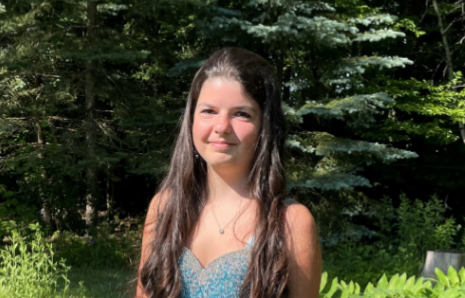Éliane's story, a cord blood transplantee
A simple but far-reaching act
In 2015, eighteen months after being diagnosed with leukemia, nine-year-old Éliane underwent a test to confirm whether her condition had improved, and remission was imminent. Against all, expectations, hopes were dashed: Éliane was not in remission but had relapsed. The cancer had returned, more aggressive than ever. A stem cell transplant was now the only option.
In August 2013, seven-year-old Éliane and her family travelled to Greece, her father’s native land. Several hours before their flight home, Éliane complained of intense pain in the knees.
It was so sudden that her parents were not worried and gave her Ibuprofen, telling her that the pain would pass. Back in Canada, Éliane consulted a physiotherapist. He saw that she was limping but could not find the source of the problem.
Two weeks later, during a family outing to the United States, Éliane’s condition worsened. She was running a fever, no longer ate anything and was unable to stand because the pain was so intense. Her parents brought her for a consultation with a doctor at the local clinic. Éliane was diagnosed with acute lymphoblastic leukemia (ALL). Quick action was needed. The family cut short their holiday and left immediately by ambulance for Sainte-Justine Hospital for urgent care.
Chemotherapy is not an easy treatment for anyone, even less so than for a seven-year-old child like Éliane. Shortly after the start of treatment, the doctors discovered that her leukemia cells were carriers of the Philadelphia chromosome, which makes lymphoblastic leukemia even more aggressive. From that moment on, the medical team tried everything, integrating Éliane into a research protocol that involved the trial of a new treatment. She remained in hospital for a month.
Life as the family knew it fell apart. Éliane’s mother put her career on hold. Her parents rotated their hospital visits to be at Éliane’s side while taking care of Zachary, Éliane’s little brother, who continued attending school.
The treatment followed as part of the research protocol gave good results for a year and a half. Éliane was better, the space between hospital stays became greater, and the hospital stays themselves became shorter. For the family, it was not only a welcome respite but a promising sign. Life began to return somewhat to normal, and one could now hope.
But the cancer had not had its final say.
In 2015, eighteen months after the initial diagnosis, Éliane, now nine years old, underwent a test to confirm whether her condition had improved, and remission was imminent. Against all expectations, hopes were dashed: Éliane was not in remission but had relapsed. The cancer had returned, more aggressive than ever. A stem cell transplant was now the only option.
Since searching for a compatible donor among siblings is always the first step, Zachary, Éliane’s brother, was tested to see if he could be a stem cell donor for his sister. Unfortunately, he was not compatible. This is usually the case three out of four times between brothers and sisters. Since Éliane’s father is of Greek origin, the chances of finding a compatible donor in the Stem Cell Donor Registry of the World Marrow Donor Association (WMDA) were slim; Greek donors are not well represented in the registry. The medical team then turned to Héma-Québec’s Public Cord Blood Bank, which is also affiliated with the WMDA. And hope was rekindled: a perfect product was found for little Éliane.
The transplant took place in 2015. Éliane was hospitalized for 11 weeks. Every day, her family gathered around her hospital bed, waiting and hoping with her. Finally, it happened. It was the end of summer, the weather was beautiful, tensions eased, and smiles returned: childhood could begin again.

Today, Éliane is planning to go into the arts. In fall 2023, she will begin college studies. She would like to contact the mother who chose to make a cord blood donation and thank her for enabling her to enjoy her childhood, story, dreams – her life.
But Éliane knows too well: cord blood donation is anonymous. Donors do not know if their generous gift will be used, or who it will help. But Éliane is proof of the importance of their generosity: this simple act is far-reaching. It is worth the effort. An entire life – not counting the lives of a patient’s loved ones – depends on the contents of this little umbilical cord.
